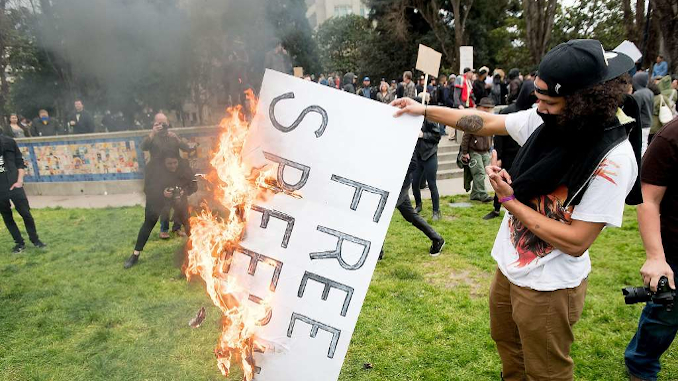
By Glen Allen, J.D.
Michael Miselis, one of the defendants in the Charlottesville Rise Above Movement (RAM) prosecution, could make a strong case that he has been the victim of a flagrant miscarriage of justice.
Much of Miselis’s ordeal has arisen because of the plea agreement he signed. No fair-minded person, however, who is familiar with the Heaphy Report about the Charlottesville Unite the Right Rally and knows the nature of the charges and ambiguous evidence against Miselis, his harsh conditions while incarcerated, and his dismal prospects for a fair trial would give much weight or credence to that plea agreement. In the agreement, Miselis admitted to participating in violence during the Rally. But the reality is that, amid a general melee, he was involved in a few minor scuffles with aggressive counterprotesters. They were never charged with any crimes. These scuffles easily could have been avoided if the Charlottesville police had done their job, as the Heaphy Report makes clear. Miselis did not seriously injure anyone, but, nonetheless, was sentenced to 26 months in prison, which he has now served.
As an essential condition of his plea agreement, Miselis reserved the right to challenge the First Amendment constitutionality of the Anti-Riot Act statute under which he was convicted. That statute, hastily enacted during the civil unrest of the 1960s, had rarely been used before the government dusted it off and invoked it against the Charlottesville pro-monument demonstrators. Its constitutional flaws are many and serious. It was, in fact, struck down on First Amendment grounds by Judge Cormac Carney in the California RAM prosecutions. Accordingly, Miselis’s hope to overturn his conviction by the condition in the plea agreement allowing him to challenge the statute was well-founded.
That hope proved a mirage. The Fourth Circuit Court of Appeals in Miselis’s case severed some of the statute’s manifestly unconstitutional language, judicially construed other language in defiance of its apparent meaning, applied the thus judicially truncated and revised statute to Miselis’s plea agreement and, by this convoluted path, upheld his conviction. In essence, Miselis was induced to enter into the plea agreement by the promise he could challenge the constitutionality of the Anti-Riot Act, but the plea agreement itself was then used to defeat his challenge.
Unfortunately, the Fourth Circuit’s logical wizardry was not the last instance in which Miselis’s plea agreement has been unfairly used against him. Before the Charlottesville events, Miselis had been a graduate student in aerospace engineering at UCLA. After he had completed his prison sentence, he was initially—for about three months—allowed to resume his studies. But, in late May 2021, he was brought before the UCLA Student Conduct Committee to face charges he was a “safety threat” to persons on the UCLA campus and should therefore be dismissed from the university. About a month later, the committee issued its report recommending dismissal.
The committee’s rationale is as illogical as the Fourth Circuit’s. The committee, relying on Miselis’s admissions in his plea agreement, concluded he is a safety threat even though: There had been no problems whatever during the three months he had been allowed to resume his doctoral studies; his remaining months of study could easily be conducted remotely, a practice the university has perfected during the Covid lockdown; he lives 300 miles from the UCLA campus and agreed he would never return to it; and his probation requirements barred him from leaving the federal Eastern District of California, whose closest boundary lies 100 miles from UCLA. The committee’s conclusion that Miselis is a safety threat is bizarrely irrational.
There is also the question of whether the university singled out Miselis for such treatment. An internet search supports an affirmative answer, for it reveals that UCLA:
- has welcomed into the university many persons with criminal records, including persons with violent convictions such as murder;
- has staff and students signatory to criminal and /or terrorist groups such as Antifa;
- has welcomed many other students who had been arrested for activities relating to protests, including violence;
- has proclaimed in mission statements the desire to remain accessible to those formerly convicted;
- has accepted state funding earmarked for promoting formerly incarcerated students; and
- has approved student political organizations presently engaged in criminal behavior, including “The Revolutionary Club,” whose parent group had been involved in violence at the Charlottesville rally.
The Fourth Circuit’s labyrinthine opinion and the Student Conduct Committee’s surreal report raise a strong suspicion that these decisions were motivated by hostility to Miselis’s political proclivities. All Americans deserve more principled and transparent decisions than these.
Free Expression Foundation has thus offered its resources to Mr. Miselis for possible redress in federal court, and we need your help.
Free Expression Foundation (FEF) is a 501c3 nonprofit organization dedicated to helping people fighting legal battles for free speech and thought. Contact: FreeExpressionFoundation.org or call 800-979-8891. You may also write or send a donation to support FEF’s work at FEF, P.O. Box 65242, Baltimore, MD 21209-9998.



If you’re still stupid enough to beg government criminals to apply the law to themselves, you deserve the consequences.